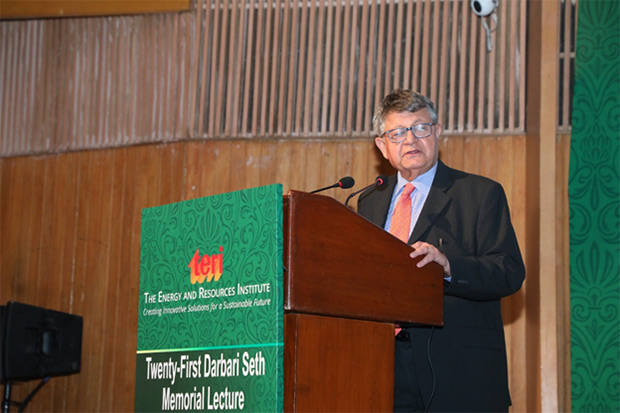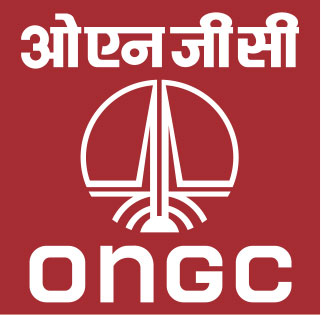भारत की स्थिरता एजेंडा को संबोधित करने के लिए क्षेत्रीय ऊर्जा प्रयासों का समग्र एकीकरण: सीएमडी
ONGC CMD said that “holistic integration of stand-alone sectoral energy efforts will enable the industry to address the country’s sustainability agenda better.” She delivered the Twenty-First Darbari Seth Memorial Lecture at Stein Auditorium, India Habitat Centre, New Delhi, on 23 August 2022.
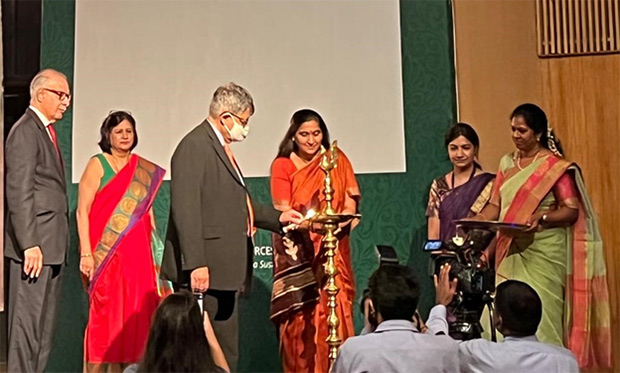
Dr Mittal started her address by thanking all the dignitaries present over there and described the event as a great honor for her. She began her lecture by saying that, “Darbari Seth was a man of great courage and wisdom. His vision, drive for innovation and ethical business acumen earned him the title of 'the man with the Midas touch'. Immensely interested in energy and environment issues, both at micro and macro levels, he founded TERI.”
“Under his chairmanship, TERI emerged as one of the pre-eminent think-tanks in the areas of energy, climate change, and sustainability in the world. I have grown up hearing and reading about Mr Seth’s numerous success stories at Tata group.”
“It wouldn’t have been more apt for me than to share my thoughts on the topic, which was very close to his heart - Energy, Environment, and Sustainable Development. I am elated to speak before you on this momentous occasion of celebrating the 101st birth anniversary of Mr. Seth today.”
“As ONGC is providing the “supply” side of Sustainability, we are doing it responsibly. We will talk about the relationship of our world with its natural resources.”
“The evolution of human civilization has been shaped by our relationship with the natural world and availability of its resources. Extensive human activities have led to a plethora of environmental problems like global warming, climate change, loss of biodiversity, depletion of natural resources, environmental degradation of soil, air and water bodies, etc.”
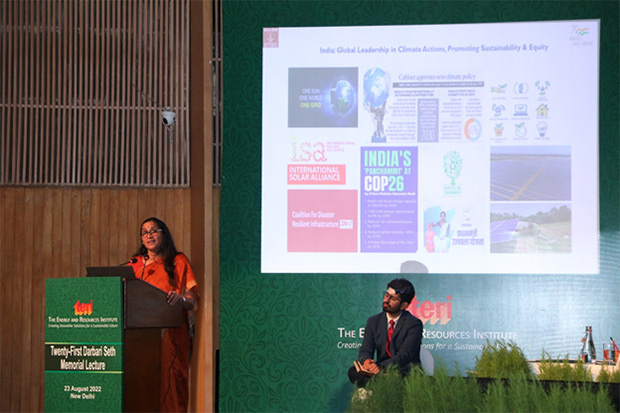
She included some interesting facts and said, “An assessment by Oxford Economics suggests that the global GDP will be around 3% lower if climate change momentum remains at the present level, assuming, average global temperatures will reach 2°C above pre-industrial levels in 2050.”
“Inter-Governmental Panel on Climate Change (IPCC)’s 6th Assessment Report (AR) released April this year confirms that in 2019 the global net anthropogenic Greenhouse Gases (GHG) emissions have been to the tune of 59-60 Giga tons of CO2-equivalent which is about 12% higher than in 2010 and 54% higher than in 1990.”
“In 2030 India might still be emitting less than what the US emits today, and about one-third of China’s emissions today, and all these despite being home to around 17% of the world’s population.”
Dr Mittal posed a question of Progress – “whether the present progress can be sustained in the future?”
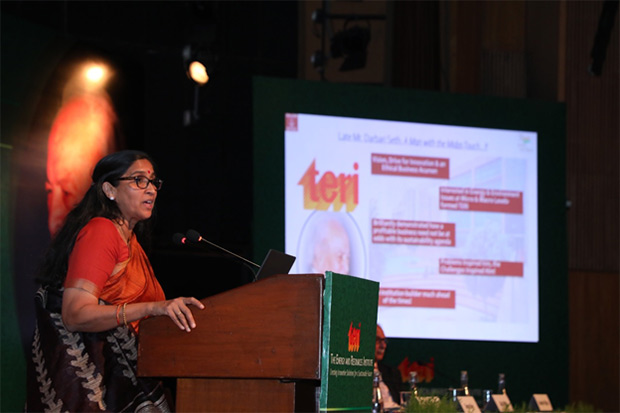
She introduced the real threats of Climate change, and said, “There is no planet B, if we cannot change how we live, we cannot fix how we live on this planet. Humankind is required to show an unwavering will to build the future trajectory of Earth’s climate towards sustainability, habitability, and prosperity.”
“India is considered among those countries which are deeply vulnerable to climate impacts. Sustainable development pathway for any country including India is no longer possible without climate policymaking, coordinated efforts and decisive actions at global and regional levels.”
Looking at the positive aspect of the nation she included, “India’s emissions are only about 5-6% of the total global emissions. India is a front-runner in climate actions, our country is one of the few countries on the track to overachieve the targets set out by the Paris Agreement.”
“At COP-26 in Glasgow last November, Hon’ble Prime Minister proposed to the world the mantra of ‘Panchaamrit’ (Five Nectars). A bold climate pledge by any count, India is looking forward to becoming a net-zero economy by 2070.”
“India has taken a series of steps at the speed and the scale required. The world is supporting India’s initiatives of the International Solar Alliance (ISA), ‘One Sun, One World, One Grid’, and the Coalition for Disaster Resilient Infrastructure, etc. Government of India schemes such as Ujjwala Yojana for cooking fuel and PM-KUSUM Yojana for encouraging our farmers to set up the solar panels are aimed at promoting sustainability and equity in the country while doing climate justice at the same time.”
“The Indian narrative of “Satat Bharat - Sanatan Bharat” sums up our country’s cherished commitment to a sustainable future for all; the motto of “Sabka Saath, Sabka Vikaas, Sabka Vishwaas” espoused by our Hon’ble Prime Minister further resonates with the core sustainability principle of leaving no one behind.”
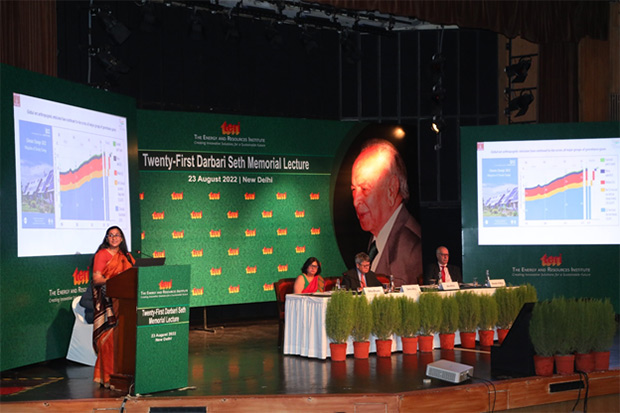
“The collective efforts of CPSEs of the strategic sector, like ONGC, could have the multiplier effect in meeting our economic aspirations, be it contributing to 500-gigawatt (GW) green energy plan, giving manufacturing push, MSMEs, digital economy drive, higher exports, $1.4-trillion infrastructure pipeline, asset monetization pipeline, etc.”
“ONGC has been steering the Indian network of UN-Global Compact one of the largest corporate sustainability initiatives in the country. GCNI drives all the 17 SDGs chartered by the United Nations.”
“ONGC works shoulder to shoulder with GCNI to balance the three dimensions of sustainable development - the economic, social and environmental and takes the UN Agenda of Sustainable Development forward.”
“Under Corporate Social Responsibility (CSR) ONGC spends to the tune of Rs. 500-600 crores every year as part of its strategic CSR projects and the bulk of these investments are aligned towards contributing to the country’s sustainability efforts, taking up a range of socially impactful initiatives bringing school education, health, sanitation, clean water closer to our communities, spreading smiles and touching lives all around.”
“The energy Maharatna has managed to substantially reduce its emission intensity in the last six years. ONGC has been a pioneer amongst all Central Public Sector Enterprises (CPSEs) in earning Certified Emission Reductions (CERs) under Clean Development Mechanism (CDM) programs.”
“We have been engaging in the afforestation drives at several environmentally fragile areas like the Himalayas and Kutch regions. We rolled out our Rainwater Harvesting and Sustainable Water Management Policies long ago.”
“We make every effort to utilize and reuse produced water for our technical purposes like preparation of Drilling Fluid, Line Flushing, Hot Water Circulation, Fire Fighting, Water Injection, etc., after certain degrees of treatment.”
“ONGC’s contributions towards conservation of environment and bio-diversity have been recognized by the UN-Conference of Parties (UN-COP) on Migratory Species. Through our flagship CSR initiatives, we have supported conservation and preservation of Amur Falcon, White Wood Winged Duck, and Gibbons in Meghalaya & Eastern Swamp Deer in Assam.”
“Unlike private players, NOCs like ONGC are not solely driven by revenue-maximization, the National Oil Companies are closely tied to the economic fate of the country and they are mandated to secure sustainable energy supplies to its countrymen along with the social equity.”
“All industry outlooks expect our energy demand to at least double by 2050 and strong growth in natural gas is expected in all the scenarios. India’s energy mix has historically been reliant on oil & gas, coal, and biomass.”
“The forecasted share of hydrocarbons is expected to remain substantial over the next several decades, both in the global and national energy mix. Our internal analysis sees nothing less than a 30% share of oil and gas in 2040 energy mix.”
“The country is making rapid strides towards a gas-based economy. The government has already set a target of 15% share of gas in 2030 from the current 6%. Also, gas is supposed to synergize with renewable technologies to balance intermittent electricity outputs and provide uninterrupted energy.”
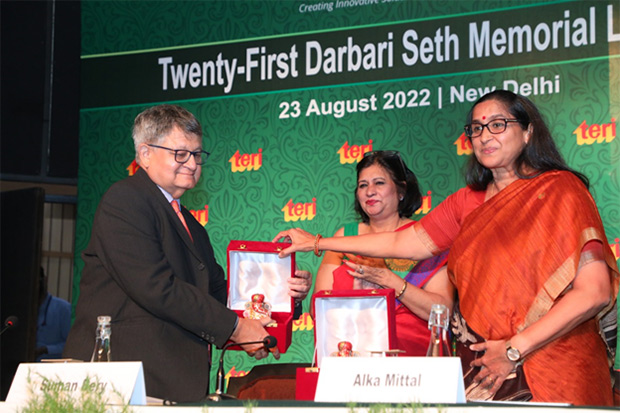
Earlier, Tata Power Board Director Nawshir H Mirza, in his opening remarks, said, “Mr Seth had the ear of JRD Tata, which he found TERI. In the area of sustainability, a huge focus is on how to reduce emissions in the supply side to produce the materials and services we need. We also need to address the demand side, by which the world’s population needs to reduce by being a more responsible consumption, by refusing to consume what we do not need. Each of us should behave in that “responsible” way.
Niti Aayog’s Vice Chairman Suman Bery while giving his Presidential address said, “Mr Seth is a pioneer in sustainability issue in energy. As a development economist, I think about integrating sustainability efforts. In India, Hon’ble PM has indicated his vision of 2047 where India wants to focus on sustainability and de-carbonization. Massive investments are required for the same, around 2.5 million dollars. The world is changing its vision from ‘Mitigation’ to ‘Inflation Reduction Act’. The issue related to consumer behavior, pricing and regulatory framework are relevant in de-carbonization.”
